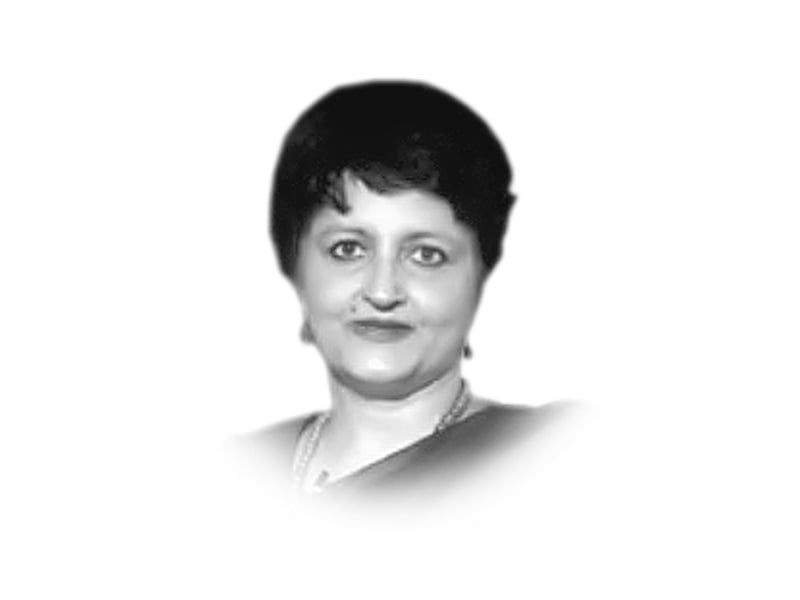
General Kayani has managed to get the respect of his people by one, allowing the elections and the democratic process to continue without interference; and two, by announcing that he will retire as scheduled. He has remained a soldiers’ soldier, refusing to dabble in politics almost like an Indian Army chief, although not quite there, as the Indian Army has remained completely out of politics. But there is a similarity. It is interesting to note that both countries have created overarching military institutions without allowing these to assume intended powers. General Kayani will hold the additional charge of chairman joint chiefs of staff committee until the government appoints the successor to General Khalid Shameem Wynne who has just retired. This was clearly intended to be a central defence body but remained a ceremonial office. The Express Tribune has reported the possibility of Kayani being appointed to the post, but only after the Nawaz Sharif government has revamped it with more powers and authority. It remains to be seen if this will be done and whether the civilian government will actually allow full military powers to be vested in one single authority. A General Kayani in such a post would probably inspire trust and confidence, but whether the same will hold true in the future would definitely create some nervousness in the civilian citadels of power.
One says this because India, too, has gone around the bush creating a structure but not appointing the key chief of defence staff (CDS) to operate it. Differences between the three defence services over the appointment of a CDS, seen as an overreaching authority, has stalled the implementation of the decision for years now. The Indian government tried to compensate by setting up the Integrated Defence Staff seen by the military as a ‘watered down CDS’. This has not succeeded in reducing the military’s isolation for nuclear policy planning that remains in the control of civilians in the ministry of defence. Experts point towards the strong inter-service competition for a larger share of India’s nuclear arsenal and the resources for developing it, with a unified approach eluding decision-makers. The CDS was to have been the central authority to harmonise these efforts but seems to have been relegated to the background now. Political concerns about setting up a supra-military body with overarching powers are also a major reason for the indecision.
Given the fact that India, where the military is totally subordinate to the political will, has hesitated to appoint a CDS, it will be interesting to see whether Prime Minister Nawaz Sharif, bloodied in the past through a military coup, will actually revamp the existing joint chiefs of staffs committee as is being mentioned in the Pakistan media as a nuclear command authority and the last word in military decisions. No wonder that despite US pressure, the Pakistani prime minister has sought time to take a decision.
It is imperative for all nations with democratic aspirations to ensure full political control over their armies. Fortunately, the founding fathers of India ensured that this became the rule, as a result of which, the defence services emerge from the barracks only when the politicians order them to. A lack of political courage makes the army appear stronger than it is at times, but even so, the checks and balances are sufficient to compensate for a weak executive.
Pakistan is clearly still struggling to establish civilian control over its defence forces and more importantly, the military industry as it were and all the ‘assets’ that have come to be associated with it. Prime Minister Sharif has made some independent noises and it remains to be seen how he follows through, particularly as for him it remains a tough job given the divisions within about the ‘all civilian’ approach.
Published in The Express Tribune, October 12th, 2013.
Like Opinion & Editorial on Facebook, follow @ETOpEd on Twitter to receive all updates on all our daily pieces.
COMMENTS (6)
Comments are moderated and generally will be posted if they are on-topic and not abusive.
For more information, please see our Comments FAQ


-(14)1720679028-0/(image-blakelively-on-Instagram)-(14)1720679028-0-165x106.webp)

1731028448-0/Untitled-design-(37)1731028448-0-165x106.webp)









@Amused Historian:
You have taken the right title"amused historian". India is neither a modern country nor had the founding fathers that yo mentioned.
Indian colony was given independence under the greement made by the two major allied powers whose participation in ww2 against the third reich was conditioned that the colonialists powers will give independence to their colonies.
Rex Minor
Miss Mustafa,
An excellent article, reminding Pakistani citizens that though a democracy, their elected civilian Government is passing though the phase of cohibition, powe sharing with the militry. This course was followed by the Turkish Government presently in power until it managed to got rid of the Kemalist Generals one by one, some to retirement and others to prison.
Mr Nawaz Sharif is not naive, has the experience and will require a great care not to cause a a second military Putsch per say. Long term strategy for the country must be to Nationalise the military and undertake a cultural revolution in the country so as to form a cohesive One Nation from current several Nations in the country.
Rex Minor
@ author
I disagree with the conclusions of your article for reasons mentioned above by others.
But for a change no anti India bile?
Whatever happened to you? Anyway keep it up
Nathan
How about the fact that the Indian military establishment now is becoming more and more vocal in giving its opinions and becoming more "Pakistan-like" in its approach.
Fortunately, the founding fathers of India ensured that this became the rule
Ms.Mustafa: This statement goes along with other silly statements like India was "just lucky" because Nehru lived longer, India is huge that's why no military rule, etc, etc.
The founders of modern Indian Republic- Gandhi, Nehru, Sardar Patel, Maulana Azad, Rajaji, and other members of constituent assembly- lived a life of sacrifice, and were intellectual giants. They had their differences, and drawbacks, but the founders of India were truly democratic in spirit.
Pakistan was founded by people who knew nothing of that sort. Starting with the top one.
We saw very vividly the debacle which the civilian control of the armed forces led to when a foolish Prime Minister, Nehru, ordered his army "to throw out the Chinese hordes" in 1962, after having gutted his country's armed forces in association with a leftist Rasputin Krishna Menon, Result: a humiliating fiasco and India exposed to overwhelming ridicule throughout the world. Read Henderson-Brooks Report on this one-sided conflict, thanks to Gandhian "bhai-bhai"ism of civilian masters who were out to prove the armed forces superfluous. The same reports lauds the professionalism of the Indian soldiers who were found frozen to death on the high mountains, with their fingers still on the triggers of their 0.303 rifles. It is downright outrageous to see a civilian Defence Secretary who has absolutely no military experience and who is there just because he passed a competitive exam, outrank and overrule fighting generals. Such a situation breeds discontent. Sooner or later, we shall repeat the 1962 debacle. Contrary to a stupid "civilian" minister of UP, army and police are not hired just to die.